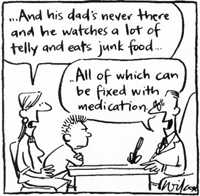
|
|
 |
|
| Home > National News > Article | Monday May 6, 2002 |
|
|
||||||||||||||||||||||
 |
Australian doctors are following United States trends by prescribing an increasing range of mood-altering and behaviour-controlling drugs to children, according to a survey to be unveiled this week.
Medications for aggression, anxiety and sleep disorders are being given to children younger than three, and some parents are misusing the drugs by giving them to siblings with sleeping problems, the study found.
Little was known about the long-term effects of some of the drugs on children, particularly the mixing of medications, said researcher and Royal Children's Hospital paediatrician Daryl Efron.
"I don't think there is cause for alarm (but) there is cause for concern and we need guidelines on their use," he said. "We need further research to ensure the gaps in research . . . are filled and research catches up with the practice."
Dr Efron said the study tried to discover what was happening with drugs
other than Ritalin, the use of which boomed in Australia in the early
1990s. "Ritalin is old news and most people think that it's appropriate
treatment for children with ADHD (attention deficit hyperactivity
disorder)," he said.
"There were reports from the United States of a big trend using other medications beyond stimulants. Anecdotally, it seemed to have started in Australia."
Dr Efron said there was no national data on the amount of drugs prescribed to children. Data on drugs that are on the PBS, such as Ritalin, did not differentiate between adult and child recipients, he said.
The nationwide survey asked paediatricians and psychiatrists for children and adolescents about their prescriptions of psychostimulants, clonidine, antidepressants, neuroleptics and mood stabilisers in the preceding 12 months, and asked what, if any, drugs they would prescribe in nine hypothetical situations.
The survey was completed in late 2000 by more than 600 doctors (more than 70 per cent of those sent a questionnaire). It will be presented to the Royal Australasian College of Physicians conference in Brisbane on Wednesday.
"It pretty much confirms the impression from anecdotes reported that these trends from the US are being repeated in Australia," said Dr Efron. "There is an increasing menu of psychotropic medication which is being prescribed to Australian children."
Asked the youngest category of patient they had prescribed - with the lowest category being under three - 8 per cent reported prescribing stimulants (such as Ritalin for ADHD) to children under three and 10 per cent prescribed clonidine (for sleep problems and aggression) to children under three.
Dr Efron said other drugs being prescribed included antidepressants, used for a range of symptoms including anxiety, obsessive-compulsive disorder and severe aggression, and neuroleptics, used for children who combined developmental difficulties and aggression, such as autism.
"Medication might be used to bring them back into the zone where they might be able to learn," he said.
A key concern was the mixing of medications and the possible effects. "We are very keen to develop some guidelines based on evidence, where it exists." Dr Efron said some parents had given overdoses of clonidine to their children. He said while all children had recovered, overdoses caused big changes in blood pressure and one child had been admitted to the intensive care unit.
The survey, by the Centre for Community Child Health at the Murdoch Children's Research Institute, showed a difference in the hypothetical prescriptions of paediatricians and psychiatrists, possibly because of the different nature of the patients they typically saw, Dr Efron said.
Paediatricians were more likely than psychiatrists to prescribe clonidine for sleep problems and neuroleptics for aggression, while psychiatrists were more likely to prescribe selective serotonin reuptake inhibitors (SSRIs) for depression.
![]() Printer
friendly version
Printer
friendly version ![]() Email
to a friend
Email
to a friend
In this section
Together as Australians, divided by allegiances
Travels with my prime minister
An insidious condition begins to win attention
The secret life of us: the new Melbourne
Solitary lives in a city divided
Telstra sale set to go ahead, says Treasurer
Bold youths take on the tough issues
Budget to benefit transport, kinders
Air force joins search for missing sailor
Melbourne's artistic elite bow before Her Majesty's
Power unions meet to plan strike action
Bleak future for women giving birth in Australia
| text | handheld (how to) | membership | conditions | privacy Copyright © 2002 The Age Company Ltd |
advertise | contact us |